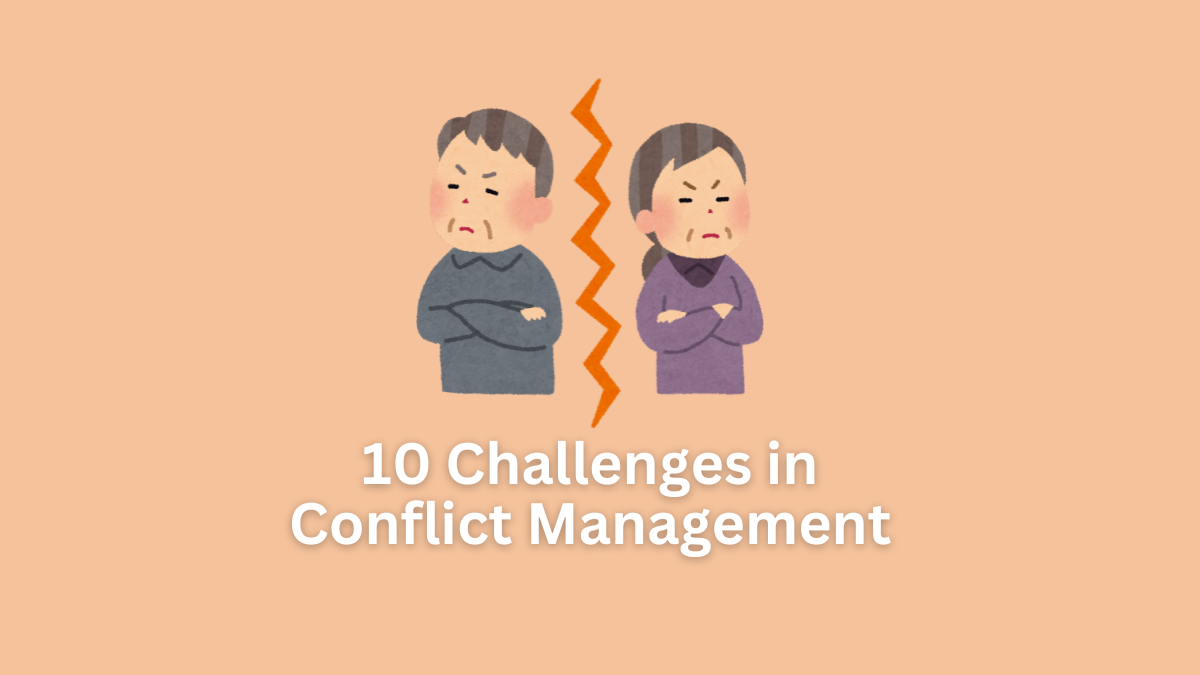Challenges in Conflict Management
Conflict management in the workplace is crucial for fostering a positive and productive environment. However, numerous challenges can arise when dealing with conflicts, requiring effective strategies for resolution.
In this article, we will explore 10 challenges in conflict management in the workplace and strategies to overcome them.
Poor Communication
Inadequate communication is the root cause of many conflicts. Misunderstandings, lack of clarity, and ineffective information sharing can escalate tensions.
To overcome this challenge, organizations should prioritize transparent communication channels, encourage active listening, and provide training on effective communication skills.
Differing Perspectives
Individuals come from diverse backgrounds and hold varying opinions, which can lead to conflicts based on differing perspectives. To address this challenge, organizations should promote a culture of diversity and inclusion, fostering respect for different viewpoints. Encouraging open dialogue and constructive debate can help teams navigate conflicts stemming from differing perspectives.
Lack of Trust
Trust is essential for effective conflict management. When trust is lacking among team members or between employees and management, conflicts can escalate.
Building trust requires consistency, transparency, and accountability. Organizations should prioritize building trust through open communication, fairness, and integrity in decision-making processes.
Emotional Responses
Conflict often evokes strong emotions, making it challenging to approach resolution rationally. Emotional responses such as anger, frustration, or defensiveness can escalate conflicts and hinder constructive dialogue.
Encouraging emotional intelligence training and providing tools for managing emotions can help individuals navigate conflicts more effectively.
Power Imbalance
Conflicts may arise when there is a perceived or actual power imbalance within teams or between individuals. Employees may feel intimidated or powerless when conflicts involve managers or senior leaders.
To address this challenge, organizations should foster a culture of equality and fairness, ensuring that all voices are heard and respected regardless of hierarchical positions.
Read More: 10 Challenges in Staffing
Ineffective Leadership
Poor leadership can worsen conflicts rather than resolve them. Leaders who avoid addressing conflicts, exhibit bias, or lack conflict resolution skills may contribute to a toxic work environment.
Investing in leadership development programs and providing training on conflict resolution can empower leaders to effectively manage conflicts and foster a positive organizational culture.
Resistance to Change
Conflicts often arise during periods of organizational change or restructuring. Employees may resist change due to fear, uncertainty, or concerns about job security, leading to conflicts with management or among team members.
To mitigate this challenge, organizations should involve employees in the change process, provide clear communication about the reasons for change, and address concerns proactively.
Read More: 10 Challenges in Leadership
Cultural Differences
In diverse workplaces, cultural differences can lead to misunderstandings and conflicts. Different communication styles, norms, and values may clash, causing tensions among team members.
Organizations should promote cultural sensitivity and provide cross-cultural training to help employees understand and respect cultural differences. Encouraging open dialogue and mutual respect can facilitate conflict resolution in multicultural teams.
Escalation of Conflict
If conflicts are not addressed promptly, they can escalate, causing further damage to relationships and productivity. Ignoring conflicts or attempting to suppress them can lead to resentment and a toxic work environment.
Read More: 10 Challenges in Autocratic Leadership
Organizations should establish clear conflict resolution processes and provide resources for mediation and intervention when conflicts arise. Encouraging open communication and early intervention can prevent conflicts from escalating.
Lack of Accountability
In some cases, conflicts persist due to a lack of accountability among individuals or teams. When there are no consequences for inappropriate behavior or actions, conflicts may continue unresolved.
Organizations should establish clear expectations, hold individuals accountable for their actions, and provide support for conflict resolution efforts. Fostering a culture of accountability promotes trust and transparency, facilitating effective conflict management.
Hence, these are the 10 challenges in conflict management and strategies to overcome those challenges.
Read Next: 10 Challenges in Group Work
